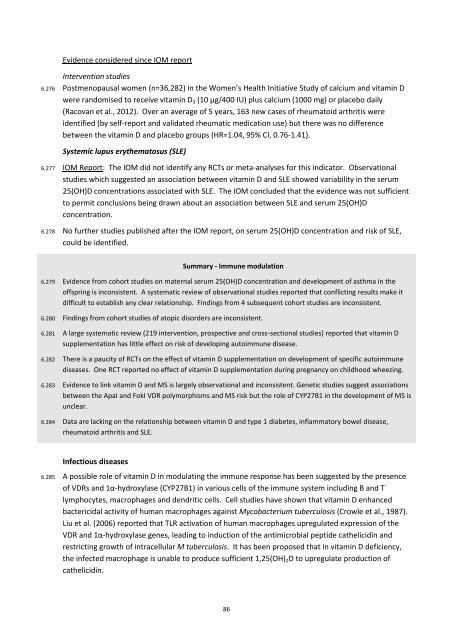Vitamin D and Health
SACN_Vitamin_D_and_Health_report
SACN_Vitamin_D_and_Health_report
You also want an ePaper? Increase the reach of your titles
YUMPU automatically turns print PDFs into web optimized ePapers that Google loves.
Evidence considered since IOM report<br />
Intervention studies<br />
6.276 Postmenopausal women (n=36,282) in the Women’s <strong>Health</strong> Initiative Study of calcium <strong>and</strong> vitamin D<br />
were r<strong>and</strong>omised to receive vitamin D 3 (10 µg/400 IU) plus calcium (1000 mg) or placebo daily<br />
(Racovan et al., 2012). Over an average of 5 years, 163 new cases of rheumatoid arthritis were<br />
identified (by self-report <strong>and</strong> validated rheumatic medication use) but there was no difference<br />
between the vitamin D <strong>and</strong> placebo groups (HR=1.04, 95% CI, 0.76-1.41).<br />
Systemic lupus erythematosus (SLE)<br />
6.277 IOM Report: The IOM did not identify any RCTs or meta-analyses for this indicator. Observational<br />
studies which suggested an association between vitamin D <strong>and</strong> SLE showed variability in the serum<br />
25(OH)D concentrations associated with SLE. The IOM concluded that the evidence was not sufficient<br />
to permit conclusions being drawn about an association between SLE <strong>and</strong> serum 25(OH)D<br />
concentration.<br />
6.278 No further studies published after the IOM report, on serum 25(OH)D concentration <strong>and</strong> risk of SLE,<br />
could be identified.<br />
Summary - Immune modulation<br />
6.279 Evidence from cohort studies on maternal serum 25(OH)D concentration <strong>and</strong> development of asthma in the<br />
offspring is inconsistent. A systematic review of observational studies reported that conflicting results make it<br />
difficult to establish any clear relationship. Findings from 4 subsequent cohort studies are inconsistent.<br />
6.280 Findings from cohort studies of atopic disorders are inconsistent.<br />
6.281 A large systematic review (219 intervention, prospective <strong>and</strong> cross-sectional studies) reported that vitamin D<br />
supplementation has little effect on risk of developing autoimmune disease.<br />
6.282 There is a paucity of RCTs on the effect of vitamin D supplementation on development of specific autoimmune<br />
diseases. One RCT reported no effect of vitamin D supplementation during pregnancy on childhood wheezing.<br />
6.283 Evidence to link vitamin D <strong>and</strong> MS is largely observational <strong>and</strong> inconsistent. Genetic studies suggest associations<br />
between the ApaI <strong>and</strong> FokI VDR polymorphisms <strong>and</strong> MS risk but the role of CYP27B1 in the development of MS is<br />
unclear.<br />
6.284 Data are lacking on the relationship between vitamin D <strong>and</strong> type 1 diabetes, inflammatory bowel disease,<br />
rheumatoid arthritis <strong>and</strong> SLE.<br />
Infectious diseases<br />
6.285 A possible role of vitamin D in modulating the immune response has been suggested by the presence<br />
of VDRs <strong>and</strong> 1α-hydroxylase (CYP27B1) in various cells of the immune system including B <strong>and</strong> T<br />
lymphocytes, macrophages <strong>and</strong> dendritic cells. Cell studies have shown that vitamin D enhanced<br />
bactericidal activity of human macrophages against Mycobacterium tuberculosis (Crowle et al., 1987).<br />
Liu et al. (2006) reported that TLR activation of human macrophages upregulated expression of the<br />
VDR <strong>and</strong> 1α-hydroxylase genes, leading to induction of the antimicrobial peptide cathelicidin <strong>and</strong><br />
restricting growth of intracellular M tuberculosis. It has been proposed that in vitamin D deficiency,<br />
the infected macrophage is unable to produce sufficient 1,25(OH) 2 D to upregulate production of<br />
cathelicidin.<br />
86


